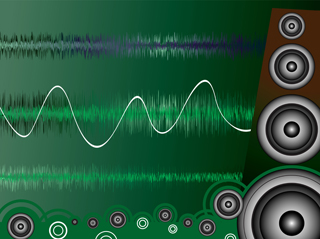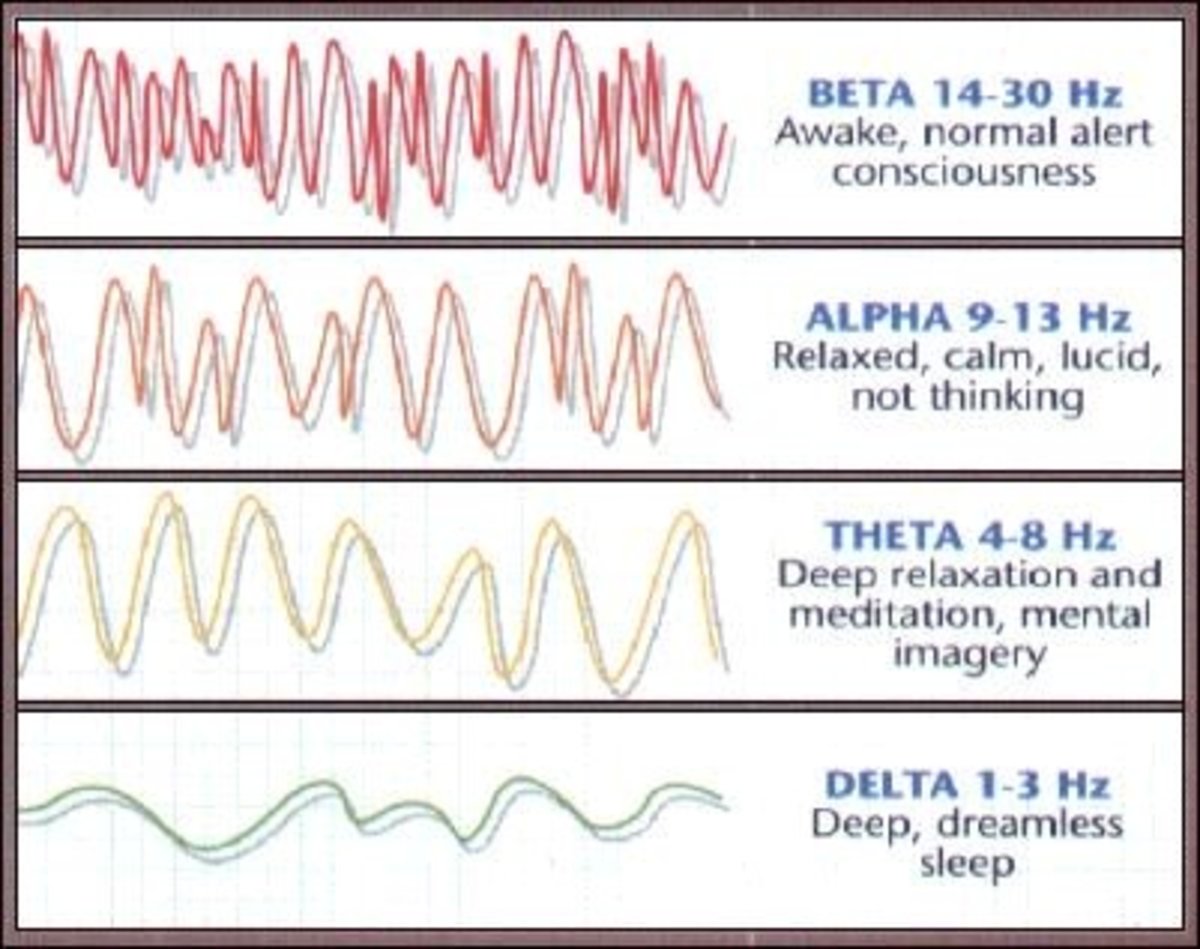Theta Meditation Benefits & Methods
Introduction
Meditation has lots of benefits, as increasing numbers of people are discovering. However, the experience you have will depend on the type of meditation you do. Theta meditation is one meditation type that offers a distinct kind of meditational experience, as well as specific benefits. Let’s look at it in more detail.
What Is Theta Meditation?
The term ‘theta’ refers to the production of theta brainwaves – or brainwaves within a frequency range of about 4 – 7Hz. In normal waking consciousness, when you’re focused and alert, the brain predominantly produces beta waves (>13Hz). When you’re more relaxed (such as when daydreaming or in a light state of meditation, for example), you produce more alpha waves (8 – 12Hz). Theta waves are much slower, and are associated with a very different state of consciousness – one in which you’re either asleep, or in a meditative trance.
When you’re in the ‘theta state’, the brain is mostly producing theta brainwaves (not entirely – brain waves of other frequencies are produced at the same time – but theta waves predominate). Everyone enters this state naturally as they fall asleep and begin to dream, and it can be rather challenging to stay awake while in theta. But with regular practice, it gets easier – and this is where theta meditation comes in. We’ll look at some meditation techniques shortly – but first, why do people want to do theta meditation in the first place?
Meditation Books & Recordings
Theta State Benefits
There are many benefits claimed for theta meditation. These include:
Greater emotional sensitivity
In theta, a lot of people find that their emotions are heightened – a great benefit for those who tend to be out of touch with their feelings normally. This applies to both positive and negative emotions, so be aware that theta meditation may lead to a greater awareness of existing negative feelings, as well as an increased sense of wellbeing.
An improvement in learning ability
The theta state also has benefits for students and anyone who needs to learn new things, as it’s linked with more effective learning abilities. Mental capacity in general may improve, and your memory and power of focus.
Deep physical and mental relaxation
Perhaps one of the strongest characteristics of the theta brain state is relaxation – both physical and mental. Your body can become so relaxed that you feel a strong ‘heavy’ sensation, or even begin to lose awareness of it altogether. Feelings of profound mental calm and peace can also arise. Theta meditation can give some of the same benefits as sleep, and some even discover that they don’t need as much sleep as usual if they do theta meditation regularly.
Improved creative abilities
It has been discovered that those who carry out creative activities regularly (such as artists, musicians etc), tend to produce more theta brainwaves than the average person. Theta wave production is linked with enhanced creativity, and by deliberately cultivating this state, your own creative abilities and expression may benefit. So this is a benefit not only for those in the creative arts, but anyone who needs to think more creatively for their work or everyday life.
Communication with the subconscious mind
The theta state is also a powerful gateway to the subconscious, and if you’re interested in self-hypnosis or other forms of subconscious communication and reprogramming, it can be very helpful. Some benefits include more easily changing your belief system to release limiting beliefs and adopt better alternatives, getting in touch with your intuition and inner guidance etc.
Better experiences with self-hypnosis and meditation
If you are already a regular meditator, or you use self-hypnosis, you may find that using a sound recording designed to make it easier to access the theta state, can make your sessions even more effective.
Greater metaphysical powers and spiritual awareness
Anyone on a spiritual path may find that theta meditation gives an increased sense of spiritual connection. Some also find that this state is helpful in the development of extrasensory abilities and other related phenomena, such as astral travel, ESP, lucid dreaming etc.
Better physical health
Theta wave production is also linked with various health benefits, including improved immune function and less stress (and therefore less of the many health problems caused by excess stress).
A general sense of freedom and authenticity
Theta meditation can also lead to positive feelings of freedom and a sense of self-empowerment. Children generally have a higher theta brainwave output than adults, and for many adults, regular time spent in this state can help recapture some of the freedom associated with childhood.
The best way to find out how theta brainwave meditation can benefit you, is to try it!

Theta Meditation Practice & Tips
So, there are lots of reasons why theta meditation may be worthwhile. But how do you actually do it?
Most meditation techniques, once mastered, can be used to enter the theta state. It is easier when you know how to achieve a deep level of mental and physical relaxation, and especially if you also have the ability to quieten down your mind. While these things are often easier said than done, and meditation can be challenging, it does get easier with practice. The most important thing is to choose a form of meditation you enjoy, rather than trying to force yourself into a practice that feels like a chore. Some popular meditation methods include:
Focusing on the breath as it enters and leaves the body (with variations such as counting the breaths you take)
Mantra meditation, where you repeat a word or phrase (a mantra) over and over, either aloud or in your head
Guided meditation, where you listen to a recording or follow a script
Candle or flame meditation, where you focus on a flickering candle or other flame
These are just some examples. Another is brainwave entrainment meditation, which is what I personally use and recommend.
'Mind Machines' on Amazon
Theta Binaural Beats & Other Brain Entrainment Methods
Brainwave entrainment happens when the brain is exposed to a repetitive stimulus, such as a sound that repeats rapidly. The brain tends to adjust its own brainwave output to match the frequency of the stimulus – this is called the ‘frequency following response’.
For example, if you listen to a sound that repeats at a 7 Hz frequency, the brain will start to produce more brainwaves in the 7Hz region. As we’ve seen this corresponds to a high theta state. So by listening to a brainwave entrainment recording with sounds that match the theta state, it becomes easier for the brain to enter this state – it kind of gets a helping hand from the recording. And over time, it’ll be easier to enter theta even without the recording, because you’ll get used to the process and the way it feels.
Binaural beats are the best known type of brainwave entrainment, and theta binaural beat recordings are widely available, both as downloads and in CD format. Other types of sound-based brain entrainment are monaural beats and isochronic tones. All three types work well, although a lot of people (myself included) find that isochronic tones are a bit more powerful for many uses. But it’s a good idea to experiment and see which works best for you.
Another option is to use a ‘mind machine’, which includes goggles which pulse flashes of light against your closed eyes – this can also have a powerful entrainment effect. These can be used alone, or as in the case of light-sound machines, with sound-based entrainment also.
Note that while brainwave entrainment is generally considered very safe, it shouldn’t be used by anyone with a history of epilepsy or other seizure-related disorders – consult your doctor before using it if you have any concerns.
Theta CDs & Downloads
There’s a lot of theta meditation recordings to choose from – in fact, the choice can be quite overwhelming. I recommend listening to any free samples that are available, so you can see if you like the general sound of the recording before buying – after all, if you find the music or sound effects irritating, the recording won’t be of much help. Looking for reviews from other users can be helpful too, although meditation is such a subjective process that you might really like a track that someone else hates, and vice versa.
Getting The Most From Theta Meditation
Whichever type of meditation you decide to pursue, it’s important to do it regularly. Meditation is like anything else, in that it gets easier with practice. Make sure you meditate in a quiet place where you won’t be disturbed, and wear comfortable clothing.
Don’t be discouraged if it feels like nothing is happening at first, or if your mind keeps wandering – this is normal, and your meditation will deepen and become more effective as you keep practising and become more experienced.
Try to enjoy the process, rather than focusing exclusively on the results you want to get from it. It’s certainly rewarding to learn to quieten your mind and enter a deep trance state at will, but there’s also a lot of value in simply showing up each day and going through your meditation practice, regardless of how it plays out.
Above all, enjoy yourself – meditation shouldn’t feel like a chore!
More Meditation & Related Articles
- Isochronic Tones - What Are They & What Can They Do For You?
Did you know that isochronic tones may be able to help you sleep better, improve your memory, be more creative, or reduce anxiety? Or if your interests are a little more esoteric, that they may also help you... - Meditation Chairs - Choosing A Chair For Meditating
Meditation chairs are becoming increasingly popular among people who like to meditate regularly. Although traditionally associated only with 'fringe' interests and people such as yogis, hippies and... - What Is Brainwave Entrainment Technology?
Would you like to be able to tap into the true power of your mind, and explore different states of consciousness at will? Or perhaps you just want to be able to function at an optimal level to sleep well,... - Mastering Astral Projection - Tips For Having Out Of Body Experiences
Mastering astral projection can be challenging, but there are ways to make the process easier, as this article explains. Astral projection, also known as out of body experience, or OBE/OOBE, is a phenomenon... - Self Hypnosis Insomnia Relief
Many people are discovering the benefits of using self-hypnosis for insomnia relief. This article takes a look at how self-hypnosis can help the sleep-deprived. What Is Insomnia? Insomnia is a condition... - Buying & Using A Weight Loss Hypnosis CD
Are you thinking about using a weight loss hypnosis CD to get your weight under control? This may be a great decision, as hypnosis has helped many people to establish healthy eating and exercise habits, and...



![Deep Theta : High Coherence Soundscapes for Meditation and Healing [Clean]](https://m.media-amazon.com/images/I/51q5y5w++yL._SL160_.jpg)






